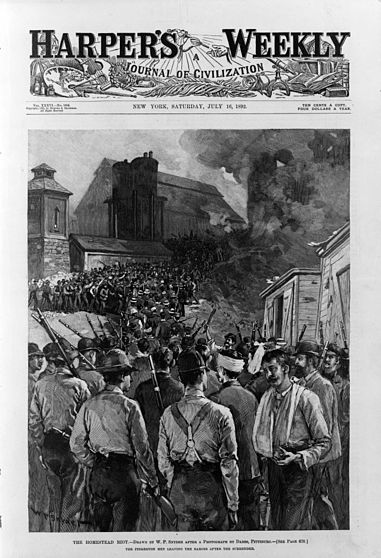(This and unlabeled images from Wikimedia Commons)
Some skepticism regarding government is of course warranted. Throughout human history, the State has been perhaps the greatest perpetrator of tyranny among our species. But this has been so largely in the service of class; Marx touched upon this when he labeled the State as part of a "superstructure" resting upon the more important economic structure of society. With some notable exceptions, State tyranny has been a tool of economic elites, employed against the mass populace.
The development of democratic political institutions has been a mitigating factor in this process. To the extent that the mass populace can control the apparatus of the State, they can prevent those mechanisms from being employed to their detriment. The system, very obviously, is imperfect. Throughout history democratic forms of the State have been more of an arena for struggle between the clases than a reliable defender of the 99%. The history of the American Labor movement, and its repression by the State acting at the behest of elites is ample proof of this.
Democratic political institutions are only effective to the extent that the mass populace avails itself of them.
This is paticularly problematic in early 21st century America. The defining characterisitic of the American mass populace is that it's inattentive and apathetic. The average American cannot tell you who their congressman is. They cannot tell you the name of even a single Justice on the Supreme Court, or who the Speaker of the House is, or how a bill becomes a law.
Many on the Left attempt to excuse this ignorance by blaming the media. Public affairs coverage in the media is notoriously poor; its superficiality is exceeded only by its scarcity. But apologists for the mass populace are confusing cause and effect in this case. Media providers are profit maximizing businesses; they respond to consumer demand. Public affairs programs get rotten ratings because the modal American viewer would rather watch anything than the news.
(image from MTV. Karma is going to be a bitch for this one.)
Nevertheless, the basic mechanisms of democratic governance remain in place, despite the American people's reluctance to use them effectively. The defining characterisitic of politicians is that they are "single-minded seekers of reelection", determined above all else to stay in office. Contrary to the conventional wisdom, that determination makes them almost frantically responsive to demand. Your elected representatives do NOT ignore you. To the contrary, they are desperate to hear what you want and to provide it. The problem is that politicians function in a sensory deprivation tank of popular demand. They hear little or nothing in the way of coherent demand from their constituents.
And so, like an individual trapped in an ACTUAL sensory deprivation tank, they respond desperately to the input they do receive... from lobbyists.
Lobbyists represent corporations, a far more sinister and unccountable concentration of power than government. The defining characteristic of business is that they are profit maximizers. They will undertake breathtakingly anti-social acts in pursuit of that maximization.
Executives of the Ford Company were warned by engineers of the design flaw that turned the Pinto into a mobile crematorium when struck in the rear. The business decision was made to not recall the Pinto, because it was anticipated that the costs of the recall would exceed the costs of paying liability claims from the families of the customers they consigned to die by fire.
(image from AR15.com)
Executives of Proctor and Gamble were warned by their medical testers that their Rely Tampon was making some of its users sick. The Centers for Disease Control later warned P&G that 70% of the cases of Toxic Shock Syndrome it had recorded involved women using the Rely Tampon. P&G's response was to deny the connection, delay action and continue to market a product that made its customers deathly ill, or killed them outright.
Executives of the A. H. Robbins Co. were warned that their recently acquired product the Dalkon Shield had been inadequately tested. Even after a rash of deaths and illnesses forced the product's withdrawal in the United States, it continued to market the product overseas. Executives at Lehman Brothers intentionally falsified its financial records in order to defraud its shareholders. And don't get me started on the cigarette companies...
It is not my intention to villify the private sector here. Business executives are not sociopathic monsters, they're just people. But people aren't all that bright; they will compulsively make the same kinds of mistakes, in the same situations, over, and over, and over again. People are not good long-term thinkers, they don't usually see the bigger picture all that clearly. Evolution has designed them to act in the moment, in response to immediate stimuli.
But that gap in our perceptual apparatus means that we cannot expect the good intentions or human kindness of business executives to protect us. Business executives are trying to make a buck. They must face short-term, immediate, in-their-face consequences to force them to consider society's larger interests. Those consequences must be provided by the power of the State. No other social organization has the power to compel corporations to consider the common good.
The State CAN tyrannize, but only to the extent the citizens of the State permit it to do so. The State CAN protect us from the otherwise unacountable power of corporations. But only to the extent it is compelled to do so by its citizens, using the political mechanisms available to them in an informed and consistent manner.
30 years of conservative propaganda notwithstanding, GOVERNMENT IS NOT THE ENEMY! It's OUR government, it will do what WE tell it to.
And, it's the only weapon we have to protect us from the 1%.
(image from The Simpsons wiki)



.jpg/800px-Larsz_-_US_election_08_(by-sa).jpg)








"Everyone tries to live at the expense of the state. They forget that the state lives at the expense of everyone. The state is the great fiction through which everyone endeavors to live at the expense of everybody else."
ReplyDelete--Frederic Bastiat
Despite the attempts of Libertarians to claim him, Bastiat was not a forerunner of the Austrian school of economics. Among other things, he was a supporter of government aid to the indigent.
DeleteSo gov't is the enemy b/c it's a slave to corporations, until the people tell gov't to stop, but the people don't do that so gov't IS the enemy, but they're not... because the title says so? - Bob Garrett
ReplyDeleteGovernment is not the enemy. Government is a tool. Democratic government is a tool available to the people, if they choose to use it.
DeleteRecently I was calling state legislators to find out the position of each on the question of adopting an amendment to the constitution to overturn the Citizens United vs. FEC decision. While I had them on the phone I asked about various issues. I found that most(lack of actual data because it didn't occur to me to count)of the staff persons with whom I spoke were not familiar with the issues. It was suggested by an acquaintance of mine that they were feigning ignorance on the topics, and simply avoiding discussions of representatives' positions. I considered that as a possibility, but in most cases (again not adequately quantified) I needed to slow down and often spell for the staffer as they wrote down my questions and comments for the elected official they represented. In many cases they attempted to relate my questions and statements to specific legislation in order to provide themselves a frame of reference from which to speak. My conclusion from these discussions is that people, even those who work very closely with elected officials, are woefully uninformed on issues of the day. If these folks are truly uninformed the general population could reasonably be expected to be mostly clueless!
ReplyDeleteArmed with only a fair amount of information while speaking on issues to the staff person of a well-known, longtime U.S. Senator, I was accused of being "the press" masquerading as a private citizen. The staffer was having a very difficult time discussing the issue for which he is the Senator's spokesperson to constituents. He informed me that he was terminating the discussion and, if I wanted a media statement, he would need to refer me elsewhere. I am not now nor have I ever been "the media."
I suspect had you spoken to the actual state legislators, you'd have found they were no more informed than their staff. State legislators are notoriously bad; they're the pols who lack the skills to be in DC. In my limited experience, state legislative staff are almost entirely concerned with constituent service. If you'd needed help with the DMV, they'd have been terrific. :)
DeleteAnd of course, you make an excellent point. The fact that the people who do this for a living are so ignorant is an indicator of the breath-taking ignorance of the electorate.
The failure in your logic can be traced to one central point. Corporations are no more greedy now than they were for the last 200 years, yet the audacity and frequency of the transgressions are getting worse. Why? All government regulation provides is a chance for shady politicians to sell loopholes to friends (the lobbyists). The government is the problem.
ReplyDeleteI can't agree. What was the South Sea Bubble, or the Dutch Tulip Crisis but the exact same mechanisms? To the extent transgressions are more frequent (and I would refer you to Sinclair lewis' The Jungle for some perspective on modern transgressions) it is because there are more actors, in absolute terms. The economy is bigger.
Delete